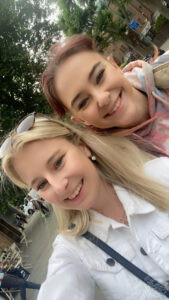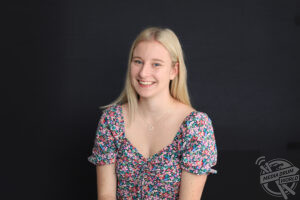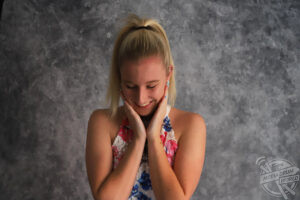By Molly Pennington
THIS WOMAN is promoting fertility awareness by sharing her story of how she only realising she was born with no womb after she had not started her period by the age of SEVENTEEN.
Previously unaware Vics Lane (20), an English student at the University of Leicester, was diagnosed three years ago with having no womb, a condition called Mayer-Rokitansky-Kuster-Hauser Syndrome.
Mayer-Rokitansky-Kuster-Hauser Syndrome (MRKH) is a rare disorder that affects only around 1 in 5,000 females.
Individuals with the condition have female chromosomes (XX), ‘normal’ external genitalia, and ‘normal’ secondary sex characteristics, but they may have underdeveloped or absent uteri and vaginal canals.
It is often treated medically through surgery or a method called dilation.
The condition develops before birth, at around 8 weeks gestation, but is often only detected when puberty begins and menstruation doesn’t start.
This was the case for Vics.

She initially went to her GP because she was struggling with eating, but when they heard that she had not started her period at age 17 “alarm bells” rang.
Doctors sent her for blood tests and ultrasounds, and she was told the devastating news that she had no uterus and no ovaries.
Further tests revealed that Vics does in fact have two small uterine remnants and two functioning ovaries, but she will be unable to carry children.
Vics is around three years post-diagnosis.
“My journey with MRKH is complicated, at times heartbreaking, but also is empowering,” she said.
“I originally went to the GP because I was struggling with eating, which we now know was a result of exam stress as I was doing A-Levels.
“She asked me about my periods, and when I said I hadn’t started yet at 17, alarm bells rang for her and she asked me to come in.
“I put it off for as long as possible before my best friend, Emma, and I made the decision it was time.
“We went together, I was completely petrified and she held my hand through it. Blood tests and an ultrasound were ordered. The ultrasounds revealed that I have no uterusand no ovaries.

“A later MRI revealed this was wrong, I have two small uterine remnants, and two fully-functioning ovaries that hadn’t been picked up on the earlier scan as they were not in the typical place, and I was diagnosed with MRKH after lots of consultations and tests.
“After this, my family and I faced a year-long battle trying to get me referred to the specialist centre in London. Doctors continuously refused to write me that all important referral letter because MRKH was something they hadn’t seen before and didn’t understand, but I needed it so I could be added to the right service.
“I am there now and have been for a couple of years, and every time I go Emma has been with me, holding my hand and keeping me calm.
“Emma is my rock .”
Vics says that there is a lot of ignorance when it comes to MRKH.
“I have faced a lot of invalidation, both online and in person,” she said.
“Phrases like “just adopt” aren’t reassuring for me, if anything they rub salt in the wound.
“As someone who had always dreamed of putting my hand on my belly and feeling my baby kick, knowing I will never be able to do that is still so upsetting.
“I have been called things like “broken” or “damaged goods”, and even in jest, this is extremely hurtful.
“People with MRKH typically work hard to not feel shame or embarrassment around their bodies and sometimes think these things without others saying them, so when they are said it makes those feelings even more prominent.
“I wish people knew and understood that an MRKH diagnosis does not make someone not a woman.
“I might not be able to carry a baby, but that doesn’t mean that I am not a woman, our womanhood isn’t defined by fertility.
“I also wish people knew that pursuing any vaginal lengthening treatment isn’t a must at any age or stage of the journey.
“So, people supporting someone with MRKH, please don’t pressure your person into treatment, it’s such a huge and life-changing step, and people with MRKH don’t have to do it at all if they don’t want to.
“It’s not a cure or a quick fix. This diagnosis doesn’t work like that.”
Vics has started to think about her future fertility already.
“Surrogacy is my first choice, which would be putting my egg and future partners sperm into a surrogates womb,” she said.
“This is something I am beginning to look into with the support of my nurse as I’d like to be sure of my options and what my future could look like.
“Even with MRKH, I still envision myself becoming a mum. My friends always say I’m the “mum friend”, so a part of me feels like it has been unfair that I have been dealt this hand.”
Vics’ parents also struggled with her diagnosis.

“My parents and I were all relieved at first, just because we finally had answers, but I know they found it hard to process too, and to see me struggling can’t have been easy for them either” Vics said.
“I know my mum blamed herself at first, I never blamed her but I think lots of mums do. When we finally met with my specialist consultant the first thing she said to my mum was “Mrs Lane, this is not your fault. You did not do anything wrong.” And this really helped my mum, she needed that reassurance.
“We both found so much safety and solace at that clinic, and I’m so glad to have the team that I do helping me. They saved me.”
She started her own charity, MRKH Stars, in the hopes of raising awareness and funds for this rare condition.
Donations can be made to MRKH Stars at https://www.mrkhstars.com/
“I am planning some new events and workshops for young people with MRKH as a part of my work with my charity,” Vics said.
“Being able to shape my diagnosis with something positive in advocacy is very beneficial to me.
“I have met so many amazing people through MRKH, including some of my now best friends, one of whom, Tk Kennedy, I jointly run MRKH Stars with.
“We crossed paths because of our MRKH diagnosis, became friends and now work together too, as Co-Directors of MRKH Stars.
“We have the same hospital team and like to meet up when we have appointments; we are on the journey together which has helped me so much.
“Knowing I always have someone to talk to who gets what I am going through and is also going through the same thing is the biggest blessing for me.
“This journey can be incredibly isolating.
“I like to say I have a bonus family through my MRKH connections.
“I’ve been able to travel across the world to see them, and have gained so many unforgettable memories and experiences.
“We have had plenty of tearful moments and the goodbyes are always the worst, but I have some amazing role models in my life now, who are there to guide me through navigating life with MRKH, and so much more.
“Starting my advocacy journey in amongst coming to terms with my new diagnosis as opposed to after I had found acceptance was tricky and still is some days; but my people are always there during the dark times so I can now be that safe-person for others just receiving the diagnosis.
“I wouldn’t change what I do, and MRKH Stars has grown so much since I created it.”
Vics encourages anyone going through an MRKH diagnosis to reach out for support.
“There is so much support out there for you,” Vics said.
“There are MRKH support groups and charities all over the world for you to access.
My charity, MRKH Stars, is for young and newly diagnosed people with MRKH and, whilst UK based, has a global team and we are always here if you need to talk, ask a question or need help with anything.
“Don’t try to face this journey alone.”
ENDS








